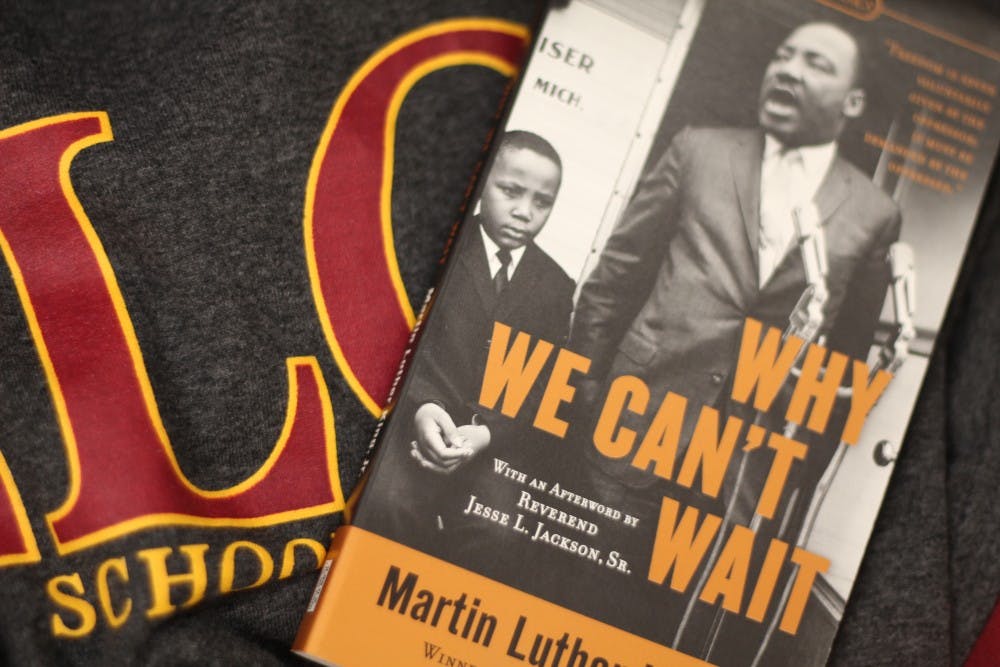In his iconic “Letter from Birmingham Jail” on April 16, 1963, Dr. Martin Luther King, Jr. wrote, “There comes a time when the cup of endurance runs over, and men are no longer willing to be plunged into the abyss of despair.” According to King, that cup ran over in 1963, and men and women nationwide emerged defiantly from the abyss of discrimination.
This summer, incoming Elon University students were asked to revisit the history of the Civil Rights Movement through the 2015 common reading selection, “Why We Can’t Wait” by Dr. Martin Luther King Jr.
The book begins with anecdotes about two children: a Black boy in Harlem and a Black girl in Birmingham. Both, though miles apart, ponder the same question: “Why does misery constantly haunt the Negro?”
From there, King launches readers into the tale of the sociopolitical landscape in 1963 that became a breeding ground for well-planned protests and lasting institutional change, examining the events and forces behind the Civil Rights Movement.
Anything written by King, whether a speech, a sermon or a book, is expected to be prolific and inspiring. “Why We Can’t Wait” does not disappoint. King develops both rhythm and momentum as he recounts a section of history scattered with
forgotten detals.
An evergreen work of social commentary, “Why We Can’t Wait” offers Elon students an opportunity to better understand the time, effort and constant commitment that are necessary for social change to happen. It is now our responsibility to keep working towards that change on our campus.
In the last academic year, Elon has experienced its own grassroots movements for civil rights. There were silent protests, die-ins, open forums and a rally for respect. Though some student-led demonstrations were spurred by repeated minority encounters with racial slurs, they were also part of a greater
sociopolitical context.
With the death of Michael Brown and subsequent lack of indictment of the officer who killed him, the United States saw the cup of endurance run over once again. In 1963, it was the cup of enduring Jim Crow — in 2014 it was the cup of racially charged deaths of unarmed minorities.
From these incidences, “Why We Can’t Wait” was chosen for this year’s common reading. The similarities between the book’s content and today’s headlines are uncanny.
King’s description of choosing between three segregationist mayoral candidates in Birmingham can be compared to the discussion of the large pool of 2016 presidential candidates, none of whom seem to have satisfied the expectations of minority activists, particularly Black Lives Matter advocates.
The postponing of mobilization in Birmingham due to the mayoral elections echoed the eleventh-hour decision of Elon students to make last year’s protest at Luminaries a silent one.
With the racial and sociopolitical debates happening across not only Elon’s campus but the entire nation, it was imperative that a book like “Why We Can’t Wait” was also chosen as an opportunity for growth. The next step is requiring students, especially those new to the Elon community, to understand why this book is still relevant today and why that fact means the nation still has a great deal of growing to do.
Teaching this book correctly and responsibly will require Elon 101 and Global Experience professors to compare this book to both the national and the local sociopolitical landscape in 2015.
Last semester, Elon’s newly-elected student body president, Avery Steadman, stood in front of her peers and admitted that she has said the N-word. This should have been a wake-up call to Elon: even the best and brightest students engage in acts of ignorance and discrimination, but this can be changed.
The choice to require students to reexamine this nation’s history of racism was more than timely, it was imperative. But it can’t stop there.
In order to continue the momentum of last year’s progress on campus, professors and students must connect “Why We Can’t Wait” with the protests and tragedies that have made national headlines.


